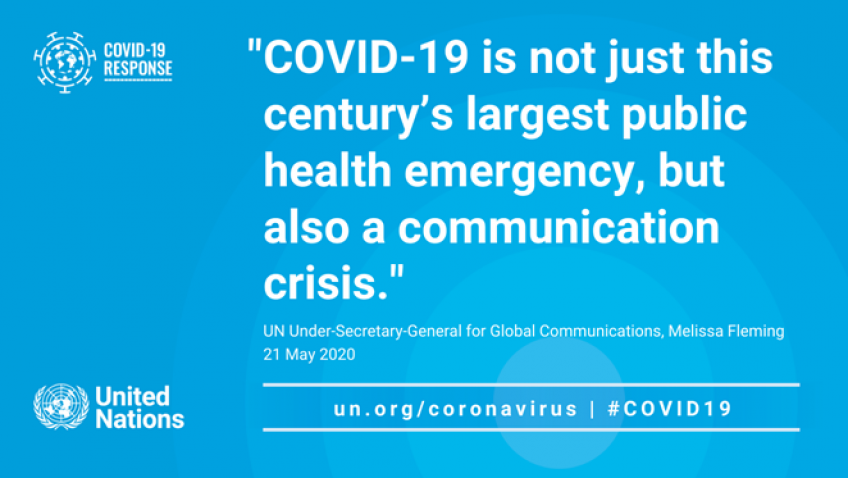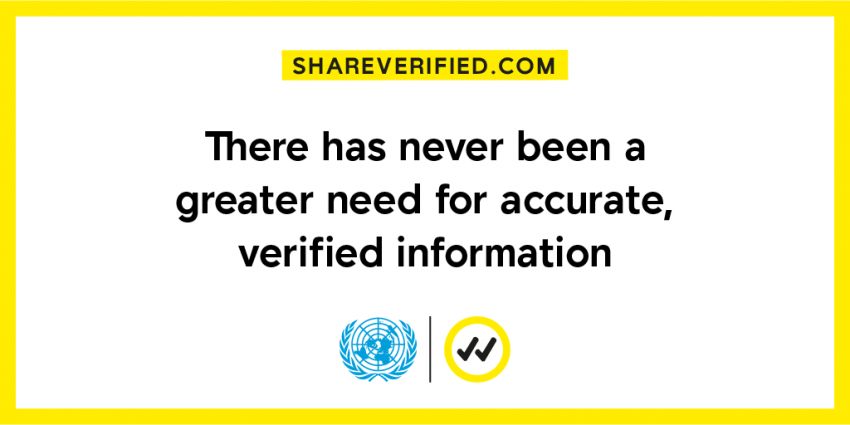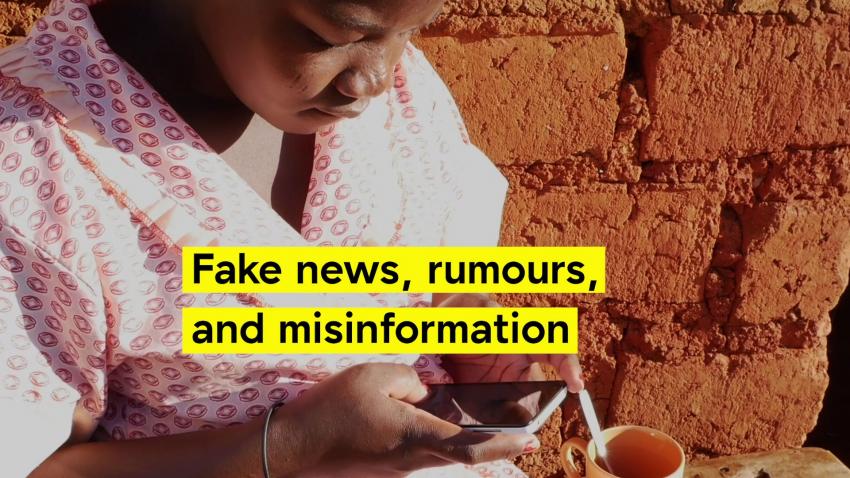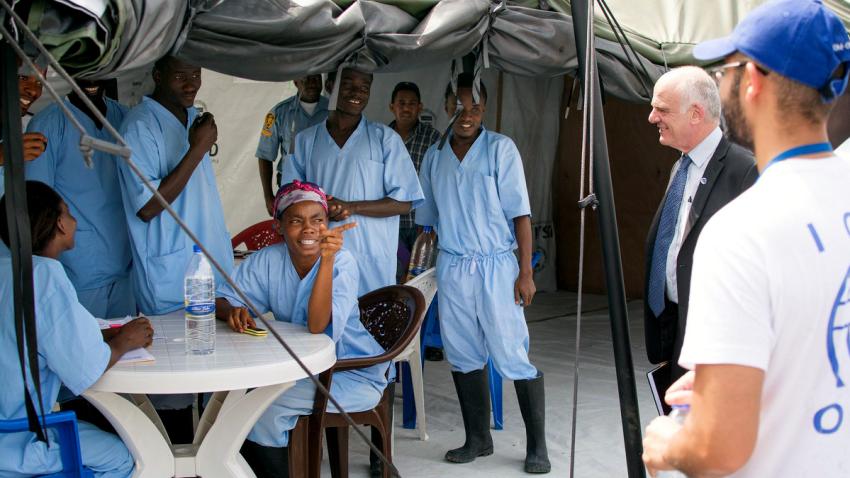“COVID-19 is not just this century’s largest public health emergency, but also a communication crisis... We need to empower everyday people to spread factual trusted information with their friends, families and social networks.” – United Nations Under-Secretary-General for Global Communications, Melissa Fleming
28 May 2020 — As the world unifies amid the COVID-19 pandemic, the United Nations recently launched ‘Verified’ -- an initiative aimed at delivering trusted information, life-saving advice and stories from the best of humanity. The initiative also invites the public to help counter the spread of COVID-19 misinformation by sharing fact-based advice with their communities.
The following are consolidated comments from Under-Secretary-General for Global Communications Melissa Fleming at the campaign’s launch on 21 May.
As we work together to contain #COVID19, we must also work to contain misinformation.
— United Nations (@UN) May 21, 2020
That's why we're launching Verified, a new initiative to deliver trusted information, life-saving advice and stories from the best of humanity. https://t.co/fIsE7lHkTF pic.twitter.com/sWaRnbkH7i
Question: What is the ‘Verified’ campaign and how does it work?
Melissa Fleming: Verified is a United Nations initiative that calls on people around the world to become “information volunteers” and share UN-verified, science-based content to keep their families and communities safe and connected. You can sign up to become “information volunteers” at www.shareverified.com.
The initiative is a collaboration with Purpose, one of the world’s leading social mobilization organizations, and supported by the IKEA Foundation and Luminate. Led by the UN Department for Global Communications, the Verified initiative will produce a daily feed of compelling, shareable content around three themes: science – to save lives; solidarity – to promote local and global cooperation; and solutions – to advocate support for impacted populations. It will also promote recovery packages that tackle the climate crisis and address the root causes of poverty, inequality and hunger. Our priority audience: those who are being targeted with misinformation. We are also partnering with First Draft, an organization which closely monitors the spread of misinformation.

Question: Who are the “information volunteers” and how can they make a difference?
Melissa Fleming: “Information volunteers” are those who are willing to help spread trusted content. We are entering a phase where information needs are becoming more complex as the crisis intersects with growing strains on societies. We are moving beyond simple guidelines, like ‘stay at home’ or ‘wear a mask’. We are seeing a rise in hate and stigmatization, and expect a further increase in the targeting of particular groups.
Social media platforms have committed to taking down or warning against dubious information, and directing users to the World Health Organization (WHO) and national health websites. But this is not enough, particularly because the most pernicious misinformation and conspiracy content spreads via messaging apps, peer-to-peer.
We know people are looking for ways to help. We believe that anybody can have a vital role in countering to misinformation. “Information volunteers” will receive a daily feed of verified content optimized for social sharing with simple, compelling messaging that either directly counters misinformation or fills an information void. We are hoping millions of people become “digital first responders”.
Question: Why launch this initiative?
Melissa Fleming: In many countries, misinformation surging across digital channels is impeding the public health response and stirring unrest. There are disturbing efforts to exploit the crisis to advance nativism or to target minority groups, which could worsen as the strain on societies grows, and the economic and social fallout kicks in.
Fiction about COVID-19 endangers public health

COVID-19 is not just this century’s largest public health emergency, but also a communication crisis. It is not because there is a scarcity of information. On the contrary, there is a glut of information. But fiction is often circulating at a faster rate than fact, endangering the public health response and ultimately people’s lives. Purveyors of misinformation are creating storylines and slick content that are filling information voids where science has no answers.
They offer promises of cures that have no evidence of benefit or may even be harmful. They are savvy about using narratives that link to people’s fears and appeal to people’s need for answers or a culprit. While misinformation has always had a dynamic in this crisis, there are signs that its role is dangerously increasing. You have seen the flood of new conspiracy theories in recent weeks. Unfortunately, in the algorithm-driven social media era, the popularity of a post often has more influence over who sees it than whether it is factual.
A recent study by the British Medical Journal concluded that over one-quarter of the most-viewed videos on YouTube about COVID-19 contained misleading information. This is not because factual information has not been uploaded by international institutions and Government agencies – those videos were just not appealing or entertaining enough to make people want to view them.
People want trusted information about the virus
According to the Edelman Trust Barometer, people are actively searching for reliable and trusted information about the virus and its effects, but 50 per cent of those surveyed say they are finding this kind of information difficult to find. And 67 per cent say they worry there is a lot of fake news and false information being spread about the virus. Polls tell us that people are turning towards institutions and scientists in ways we have not seen in decades, reversing a decline in trust.
The role of the United Nations in providing a global voice of guidance and direction is more important than ever.
Question: How do we push back against misinformation?
Melissa Fleming: United Nations Secretary-General António Guterres rightly said that we need to “flood the Internet with facts and science, while countering the growing scourge of misinformation — a poison that is putting even more lives at risk.” UN communicators have been working around the clock promoting WHO guidance and the Secretary-General’s policy briefs across all UN platforms and with the news media. People are turning to our UN platforms and social media feeds for facts in unprecedented numbers.

UN stories that showcase best of humanity, opportunities to ‘build back better’
We will not win the communications war with press releases and fact sheets. This is a digital battlefield, and we need to communicate with compelling and sophisticated new methods. Just as misinformation spreads and metasticizes person-to-person, so too do institutions need to do more than just issue pronouncements and facts. We need to empower everyday people to spread factual trusted information with their friends, families and social networks. This is why we are collaborating with Purpose to produce a daily feed of compelling, shareable content.
We cannot cede our virtual spaces to those who traffic in lies, fear and hate.
— António Guterres (@antonioguterres) May 26, 2020
Visit https://t.co/KNcR8hTHro to see how you can become a digital first responder and help stop the spread of misinformation on #COVID19. pic.twitter.com/uzP0fxwcln
We have also reached out to Member States, UN media partners, celebrity supporters, Messengers of Peace, businesses and the social media platforms to help us disseminate to the millions we will need to reach to fill the information void with trusted content.
Our teams are closely monitoring the spread of misinformation, its origins and where it travels, and we will focus on audiences who are widely receiving and sharing misinformation. We will also focus on generating support for vulnerable populations and countries through content focused on the best of humanity and opportunities to ‘build back better’, in line with the Sustainable Development Goals and the Paris agreement on climate change.




